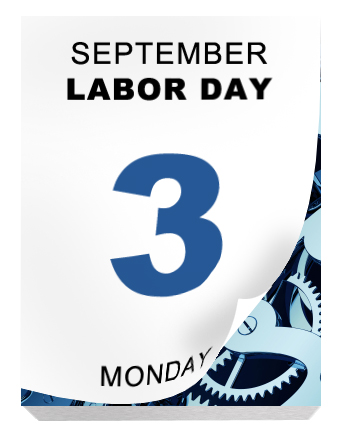 Labor Day is this Monday. The day that marks the unofficial
end of summer is also a key indicator for anyone involved in marketing. This is
the beginning of the cycle of marketing planning for the next year that
includes deciding what you will be doing to promote your business and coming up
with a budget to support it. As you ready yourself for the discussions that
make up your strategic marketing plans for the next year, let me lend you a little
advice to get you on the right track.
Labor Day is this Monday. The day that marks the unofficial
end of summer is also a key indicator for anyone involved in marketing. This is
the beginning of the cycle of marketing planning for the next year that
includes deciding what you will be doing to promote your business and coming up
with a budget to support it. As you ready yourself for the discussions that
make up your strategic marketing plans for the next year, let me lend you a little
advice to get you on the right track.
Try something new
Don’t just base your future marketing activities on the
success of your past efforts, but on what your customers want from you. The old
thing is the old thing. There is a tendency in marketing to keep playing the
same record again and again… and customers get tired of dancing to the same
song. Marketing should keep things fresh for your customers. Before you plan
anything else, listen to what your customers are saying they want from you.
Don’t just give them what you think they need: that typically becomes a
guessing game that may work or could flop miserably. Take the guessing out of
it! Make asking your customers for feedback a key part of your future marketing
plans. If you get a sense of what they want, build on it.
Budget for all three
phases of marketing
Here is where many modern marketing plans fall down: they
spend all their marketing budget on making their target market aware of their
brand, but nothing on getting the target to actually buy anything. Big mistake!
If marketing is not enticing people to buy what you are selling, you are
missing the mark. Brand awareness is very important. No one will buy what they
don’t understand. However, they typically won’t buy anything that they are not
prompted to buy for the first time. Make sure you are not only putting a
portion of your budget towards Awareness and First Time Sales, but also don’t
forget your current customers. You need to budget for Retention Marketing as
well. If you strike a balance with all three of these phases, you will be
working from a well rounded marketing strategy.
Should you budget for
little Johnny’s soccer club?
What about all the little asks during the year, especially
those that align more with your local community or one of your employee’s kids rather
than your target market? There is a long list of charities and non-profit
organizations that would love to get a donation from you next year. They will
eventually come knocking on your door. There are two things I will say here.
First, goodwill is very marketable. If you decide to support the local troupe
of campfire girls or some other group, make sure you take advantage of social
media posts, the use of your logo on sponsorship signs, and any involvement
with these groups. Today’s consumer is more aware than ever of corporate
involvement with charities. As a marketer, you are in charge of your brand’s
reputation. Make the most of it by getting the word out about your sponsorship.
Secondly, I would encourage you to come up with a plan for who you are going to
support. Let me explain. I have worked with companies that let their employees
drive where charitable marketing dollars go. This is usually a joint effort
between HR and Marketing departments. It is best when you have some parameters,
such as an employee of the company has to be involved in the charity before you
will give them money, or you decide what types of charities fit your employees
the best. For instance, we have a current customer that is very involved in the
prevention of child abuse. They support charities that are advocates for
children in this area. That means they don’t give to a whole host of other
worthy causes because they have focused their efforts as a company on one
issue.
There is one other consideration with your charitable
giving: what is the involvement of your current customers? You can score points
with them if you find a charity to which they also feel strongly.
One more thing
One other consideration you should plan on in your marketing:
find a way to touch people. We are living in a time where so much of our
communication lacks a personal touch. But the need for interaction between your
employees and your customers is crucial to your marketing. One of the big
reasons people leave vendors is they don’t have a personal connection with
them. It is easy for a consumer to feel like they are not valued by a company.
If you want to be successful in marketing, you have to touch people. Plan on
it.
Labor Day is the unofficial start of the marketing planning
season. Make sure you are planning from an informed position this year. Your
business success for the next year depends upon it.